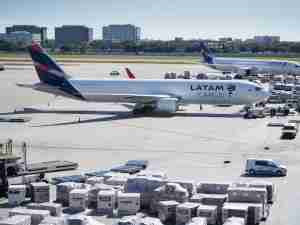The U.S. and Japanese governments advised their citizens to avoid travel to China as the spread of the coronavirus showed few signs of abating.
The travel warnings came hours after the World Health Organization declared the outbreak a global health emergency. Global cases of the disease has now grown to surpass the number officially reported during the SARS epidemic.
The U.S. issued a Level 4 advisory, the most severe travel warning category, and said that Americans currently in China should also try to leave.
Japan raised its travel warning to Level 2, which urges travelers to avoid unnecessary travel to the country. For Hubei province, the epicenter of the outbreak, its travel warning is at Level 3, which restricts all travel to the location.
The total death toll rose to 213 while confirmed cases in China jumped to 9,692, the National Health Commission reported Friday, up from about 7,700 a day earlier.
U.S. health officials also reported the first case of human-to-human transmission of the coronavirus, in a woman who traveled to China and then infected her husband. India documented its first case on Thursday, while Russia closed its land border with China to travelers.
Japan Criticized for Virus Gaps; Australia Isolates Returnees on Christmas Island (11:53 a.m. HK)
Tensions are rising across Asia as governments bring their citizens home from the outbreak epicenter in China, risking greater exposure among domestic populations.
In Japan, the government was criticized for allowing some of the returnees—evacuated from Wuhan this week—to return home without quarantine. The government said Friday that it would speed up the implementation of an order allowing compulsory hospitalization and barring entry to people with symptoms caused by the new coronavirus infection.
Other countries undertook strict quarantine measures for returnees: Australia plans to isolate its own evacuees from Wuhan on Christmas Island, better known for its grim history as a detention center for would-be asylum seekers, while the U.S. flew its citizens from the virus-stricken Chinese city to an isolated military base in California.
Also in Australia, airport security workers threatened to strike unless given protective equipment to guard against the virus.
Some airport staff have been barred from wearing protective gear such as face masks to avoid upsetting customers, the United Workers Union said in a statement Friday. The union represents 150,000 workers in Australia from more than 45 industries.
Taiwan President Seeks Inclusion in WHO Efforts (11:15 a.m. HK)
Taiwan is afraid of being left out after the WHO declared a global health emergency.
“As a major transportation hub in the Asia Pacific region, Taiwan must be included in efforts to prevent the spread of the coronavirus outbreak,” Taiwan President Tsai Ing-wen said in a Twitter post Friday. Taiwan currently has nine confirmed cases of the virus.
The United Nations agency has excluded Taiwan from its annual summit for the past several years amid pressure from China.
“Taiwan’s absence from the WHO creates a serious gap in the global health network,” Tsai said. “Our medical & public health personnel have both expertise & experience, and our people deserve an equal right to health.”
The U.S. Tells Americans to Leave China (9:59 a.m. HK)
The U.S. State Department on Thursday night warned Americans not to travel to China because of the spreading coronavirus outbreak.
“Those currently in China should consider departing using commercial means,” the department said in the advisory, which was Level 4, the most severe travel warning category.
The Level 4 advisory puts China among several nations that the U.S. warns its citizens to avoid, including North Korea, Venezuela, Iran, Iran and Somalia.
Earlier Thursday, President Donald Trump wrote about efforts to combat the infection in a Twitter post. “Working closely with China and others on Coronavirus outbreak. Only 5 people in U.S., all in good recovery,” he said.
More Chinese Cities Extend Holiday Break (9:07 a.m. HK)
More regions in China extended the end of the Lunar New Year break beyond Feb. 2, in an effort to control the spread of the virus.
The city of Chongqing and the provinces of Hebei, Anhui, Fujian, Yunnan, Shandong and Jiangxi said businesses need not start operations until at least Feb. 10. They join Shanghai, Inner Mongolia and the provinces of Guangdong, Zhejiang and Jiangsu, which had already announced extending the holiday.
The break was originally due to end on Jan. 30 across China, but was stretched to Feb. 2 on Monday.
Study Sees Early Signs of Human Transmission (8:38 a.m. HK)
The coronavirus was spreading from person to person earlier than reported, according to a study by Chinese scientists.
Among 47 cases that occurred during 2019, 14 had been in contact with another person with respiratory symptoms, indicating likely human-to-human transmission, researchers from the Chinese Center for Disease Control and Prevention said in a study published Jan. 29 in the New England Journal of Medicine. Their analysis of the first 425 cases in Wuhan found that in its early stages, the epidemic doubled in size every 7.4 days.
“There is evidence that human-to-human transmission has occurred among close contacts since the middle of December,” Qun Li and colleagues said. Official confirmation of such transmissions weren’t reported until weeks later.
Global Virus Cases Now Top Official SARS Count (7:58 a.m. HK)
The total number of coronavirus cases around the world has reached more than 9,800. That tops the count from the SARS epidemic, which in 2003 saw 8,096 officially reported cases, according to the WHO.
The latest tally shows the speed with which the new virus has spread in a short period of time, from the first case in December. It’s reached the same level that the SARS epidemic did during its span of about eight months.
An overwhelming number of the cases, as with SARS, are in China. The country currently has 9,692 confirmed cases, while there are about 100 cases outside Greater China across 18 nations.
The numbers come with a footnote, however. SARS cases were widely considered to be under-reported, as possibly thousands went undocumented in the first few months. At the same time, the official count for the current virus is likely to be below the actual number of cases, as health officials scramble to widen testing.
Economist Sees Far Bigger Impact Than During SARS (7:35 a.m. HK)
The global cost of the coronavirus could be three or four times that of the 2003 SARS outbreak that sapped the world’s economy by $40 billion, according to the economist who calculated that figure.
The sheer growth in the Chinese economy over the last 17 years means the global health emergency triggered by the coronavirus outbreak has far greater potential to gouge global growth, according to Warwick McKibbin, professor of economics at the Australian National University in Canberra.
WHO Calls Coronavirus International Emergency (3:06 p.m. NY)
The World Health Organization declared the coronavirus outbreak centered in China a public health emergency of international concern, a step that will let public health authorities aid countries with less-robust health systems to stop the spread of the virus.
WHO Director-General Tedros Adhanom Ghebreyesus praised China‘s efforts to contain the outbreak, saying he had never seen a nation respond so aggressively to a disease, including building a new hospital in just 10 days.
“Let me be clear: This declaration is not a vote of no confidence in China,” Tedros said. “On the contrary the WHO continues to have confidence in China’s capacity to control the outbreak.”
It’s a contrast to the criticism China faced for a lack to transparency during the SARS pandemic 17 years ago, which killed almost 800 people.
Tedros says there’s no need at this time for measures that interfere with travel and trade, even though many governments, airlines and businesses have already taken such steps. He also urged people to be careful of rumors and rushing to judgment.
“This is the time for facts not fear,” Tedros said. “This is the time for science not rumors. This is the time for solidarity not stigma.”
In the past, the WHO has come under fire for raising the alert too soon as well as too late. The last respiratory illness to trigger a health emergency was the flu pandemic of 2009, which caused widespread alarm but ended up being relatively mild. The WHO’s emergency committee, a group of infectious-disease experts, last week delayed a decision on whether to make the emergency declaration.
U.S. Has First Human-to-Human Transmission (12:43 p.m. NY)
A woman in Chicago who had been diagnosed last week with the coronavirus infected her husband, the Centers for Disease Control and Prevention said Thursday, the first case of human-to-human transmission to occur in the U.S.
Both patients are in their 60s and are doing well while being kept in isolation, CDC officials said on the call.The agency said the virus is not spreading widely and that the risk to the U.S. public remains low.
Disease experts are still trying to understand exactly how the virus spreads, and at what point after a person has become infected they become contagious. It’s also not clear, said CDC officials, how long a person has to be sick for before they will test positive. Both factors can present a challenge for public health workers who are keeping close tabs on contacts of people considered at risk.
The man and the woman had been in close contact, said the CDC, which appears to raise the risk of people becoming infected.
European Airlines Halt China Flights (12:09 p.m. NY)
European carriers led by British Airways said they’re temporarily quitting China as the deadly coronavirus spreads, following decisions by U.S. carriers to limit flights to the country.
BA took the most dramatic step, saying Thursday it will cease flights to Beijing and Shanghai until March 1 after acting on U.K. Foreign Office advice. Iberia, its Spanish sister carrier at IAG SA, is also suspending operations, while Deutsche Lufthansa AG, Air France and SAS AB said they’ll exit China until Feb. 9.
In the U.S., President Donald Trump’s economic adviser Larry Kudlow said the decision on canceling flights would be left to U.S. airlines, for now. Almost 11% of flights scheduled to or from China were scrapped between Jan. 23 and Jan. 28, based on research from Cirium, which analyzes air travel.








